Edie Melson's Blog, page 205
March 28, 2020
Let Go of the Steering Wheel
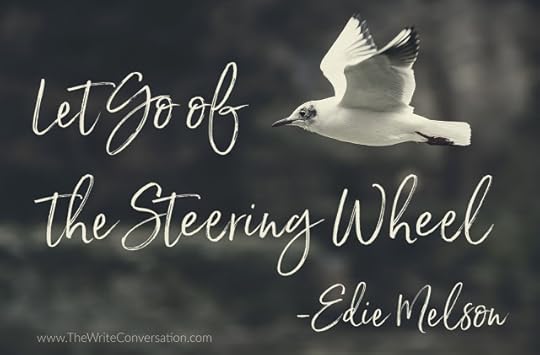
by Edie Melson @EdieMelson
There are times in my life when making the right decision seems like a no-brainer. Unfortunately those times are few and far between.
For those of you who visit my blog regularly it will come as no surprise that I tend to be a little bit of a control freak. And that character trait often makes it difficult to follow God unconditionally. Let me give you an example.
So we began to discuss the possibilities. My husband, ever the engineer, made lists of pros and cons. While I, the creative right-brained one, tried to discover how I felt about the chance of moving. We wrangled over the decision for weeks, but for every pro there was a con, and for every upside there was a corresponding downside. The situation had us stymied.
Then one night, as I drifted off, I was captivated by a dream. I was the passenger in a car, a convertible to be exact, and we were driving a dangerous, winding road that led the side of up a mountain. The road was a tiny two-lane affair, minus guardrails. There were granite cliffs on the mountain side of the road, and a sheer drop to the valley below on the other. I knew about the drop off because the driver kept veering toward the edge of the cliff and I’d have to reach over and yank the steering wheel to keep us from crashing into the valley below. As we hurtled toward the top of the mountain we were up so high I could occasionally see clouds below us.
Finally, I got really irritated because it seemed the higher we got the more often I’d have to pull us back from the edge, and it suddenly occurred to me I didn’t know who was driving. While I kept a cautionary hand on the steering wheel, I risked a quick glance at the face of the person driving.
Even though I couldn’t describe the features to you now, I immediately recognized him…it was Jesus driving the car.
I was immediately mortified and jerked my hand away from the wheel and sure enough, He drove us right off the edge of the mountain. But we didn’t crash. No, instead we were suddenly free, and soaring above the mountain. I don’t remember Him saying anything, but he held tightly to my hand, and I remember Him smile.
At this point I woke, and shook my husband awake to tell him about my dream. He got excited and gave me hug, “That’s it. That’s the answer.”
I was still a little groggy, and I voiced the first thought that came to me. “Okay, but what’s the question?”
He laughed and hugged me again. “That’s our answer about moving. We’ve been trying to make the decision all by ourselves. God wants us to just let go and follow Him.”
Within the month we were gone, headed to South Carolina. It has been one of the single-best decisions we’ve ever made. That decision caused a domino effect in our lives leading us straight to God, strengthening our faith as well as our family.
Now I find myself at another cross road, with God once again asking me to trade the security of what I know and am comfortable with, for His path, which leads only He knows where.
You might think the choice would be simple this time, but it isn’t. Never the less, I’m determined to trade my control for His. I’ll let you know how it turns out!
But what about you? What part of your life is God trying to get you to relinquish to Him?
I invite you to join me as I let go of the steering wheel.
After all, those who trust in the Lord will renew their strength; they will soar on wings like eagles; they will run and not grow weary; they will walk and not faint. (Isaiah 40:31)
TWEETABLE
Let Go of the Steering Wheel - encouragement from @EdieMelson (Click to Tweet)
Published on March 28, 2020 22:00
Help—Someone wants to use my content!
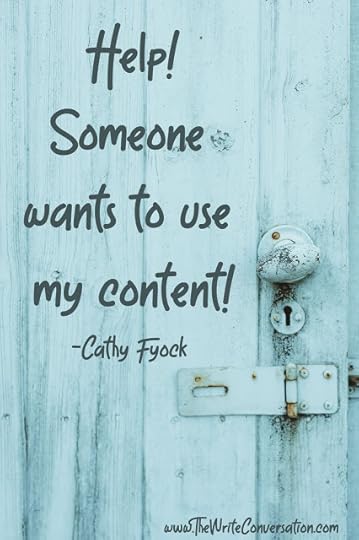
by Cathy Fyock @CathyFyock
“Cathy, I just did a presentation and it went really well. I’m concerned because someone from my session asked if they could use my content. What do I do?”
It’s the dilemma faced by most speakers, trainers, consultants, coaches, experts, and thought leaders who use their expertise in the course of their businesses. We want to be regarded as thought leaders, yet we also need to retain ownership of our Intellectual Property (IP). As a thought-leader, you are paid for your IP. And you are only a thought-leader if others know what you think and follow you. So how do we walk the tightrope and socialize our ideas while retaining ownership of what is rightfully ours?
First, let me say this: this is a great problem to have! It means that what you’re doing is working. You are saying something at a meeting or conference that has people taking notice. When others want to capture your ideas and share it with others, it means that your ideas are “sticky.” People get you. You are saying something that others are gravitating toward. You are capturing ideas in a unique and creative way that hasn’t been said before.
So for starters, you need to know that you’re on the right path. Imitation is truly the sincerest form of flattery. But, if you want to make a living using your IP, you’ll need to protect your content AS you socialize it.
Here I’ve outlined some of the most common issues I’ve experienced when walking the IP tightrope.
When you submit an article or guest post. Be sure to include your byline EVERYTIME you submit content for publication. Your byline should be brief—one or two sentences at the most—and should summarize how you work with clients and how they can reach you. Here’s my sample byline:
Cathy Fyock is The Business Book Strategist, and works with professionals and thought leaders who want to write a book as a business development strategy. She can be reached at Cathy@CathyFyock.com or 502-445-6539.
DON’T tell your life story or try to include all your credentials since the publisher will likely not include it. Remember, the end goal is to have people reach out to you to engage you for your services after reading your article.
I also strongly suggest that you include a professional photo.
When you offer handouts. I’m a big believer in handouts that summarize your key points when you’re keynoting or leading a training session. ALWAYS include your contact information on the bottom of each page. I do this by using a footer with the copyright sign (©):
© 2020 Cathy Fyock, The Business Book Strategist, http://www.bizbookstrategist.com/, 502-445-6539.
This not only protects each page of your material, but also allows attendees who keep that one page of your material be able to find you later when they want to hire you.
In handouts that are more than one page front and back, use the back page to include a full bio of you with all your credentials, including your contact information.
When you use Power Point slides when speaking or training. Occasionally I’m asked by audience members if they can have my slide deck. Over the years I have had varying policies. Early on I just didn’t share the slide deck at all. That seemed a little extreme. More recently I’ve offered to share the PDF of the PowerPoint, which seems to meet the needs of most.
When someone wants to republish an article or post. Generally, I love this because I’m getting additional exposure for work I’ve already done. I will grant permission to use my material with proper attribution. I explain that includes using my byline in their publication (see above). If the publisher wants me to assign rights, I grant one-time permission to use my work (that allows me to continue to use it, and for others to also use it). If a publication wants “all publication rights” I generally ask for some remuneration, unless the publication has such cache that I know it will bring me business or give me valuable market exposure.
When someone wants to “share” your presentation with their chapter/company/association. This is tricky. Again, you want for your content to be socialized, but with proper attribution. And, you don’t want to miss out on sales that you might make from a possible presentation to this group. When I receive these types of requests, I might say something like: “Thanks so much. I’m so glad that this material resonated with you. While I love it when my ideas are shared, I’m wondering if it might be possible for me to do a presentation for your group.” Then, you should talk with the individual to determine next steps.
In the end, it comes down to one big question: how much of the “secret sauce” do you share? When I’m asked this by authors and aspiring authors, I share my personal philosophy, which is about abundance. I truly believe that the more you give away, the more that comes back to you. The more ideas I share with others, the more that seems to help potential clients see my value and the more business I book.
What are the ways in which you have balanced the need to socialize your IP with the need to protect your IP? Share your ideas at Cathy@CathyFyock.com.
TWEETABLEHelp—Someone wants to use my content! - Tips from @CathyFyock on @EdieMelson (Click to Tweet)
 Cathy Fyock is The Business Book Strategist, and works with professionals and thought leaders who want to write a book as a business development strategy. Since starting her business as a book coach in 2014, she has helped more than 160 professionals become published authors. Her most recent book is The Speaker Author: Sell More Books and Book More Speeches. She can be reached at cathy@cathyfyock.com or 502-445-6539.
Cathy Fyock is The Business Book Strategist, and works with professionals and thought leaders who want to write a book as a business development strategy. Since starting her business as a book coach in 2014, she has helped more than 160 professionals become published authors. Her most recent book is The Speaker Author: Sell More Books and Book More Speeches. She can be reached at cathy@cathyfyock.com or 502-445-6539.
Published on March 28, 2020 01:00
March 26, 2020
Encouragement for Writers Who Don’t Like to Rest

by Lori Hatcher @LoriHatcher2
The concept of rest is foreign to my Type A personality. I’m a doer, not a sitter. I agree with the philosophy of the pastor who said he’d rather burn out than rust out. But since burning out isn’t my goal, I’d rather work smart than work hard. Success requires some of each.My disinclination toward rest is why Exodus 35 caught my attention. In the passage, Moses had just returned from receiving the Ten Commandments on Mount Sinai for the second time. The Israelites’ next task was to build the Tabernacle.
This was an enormous project requiring thousands of hours of man (and woman) power, skilled craftsmen, and donations from each household. But God was in charge. He gave Moses instructions on how to craft everything from the framework that supported the tent to the inward accoutrements. God’s house—the place where His presence dwelled—would be a project like no other.
But before Moses rolled out the blueprints, he gathered the Israelites together to set the tone and scope of the project.
If I were giving that groundbreaking speech, I’d say something like, “Okay, everyone, this is a big project, and we’re laboring for the Lord. We’re building God’s house. I expect you to work hard, fast, and efficiently. Plan for long hours and lots of overtime.”
But that’s not what he said. Instead, he referenced the commands God had given them and spotlighted the fourth one:
"Work shall be done for six days, but the seventh day shall be a holy day for you, a Sabbath of rest to the LORD. Whoever does any work on it shall be put to death. You shall kindle no fire throughout your dwellings on the Sabbath day" (Exodus 35:2-3 NKJV).
Whaaaaat? Moses! How are you going to get anything done if you take one day off out of seven? Really? I know it’s a good idea to rest occasionally, but isn’t there room for exceptions? This tabernacle is a big deal. We get one chance at this. And we’re working for GOD. Wouldn’t He look the other way, just this once?
I’m preparing to launch my latest book, Refresh Your Faith, Uncommon Devotions from Every Book of the Bible , in May. It’s a big project, and my list of tasks-to-do-before-launch-day stretches longer than the carpool line at the local elementary school. With May 5 in my sights, I’ve been gearing up to work long hours with little sleep. Seven days a week, if necessary.
But not after reading Exodus 35. Poised to launch the biggest endeavor to date, Moses, the project manager, under the direction of God, the owner, tells the workers, “Be sure to take a day off. Every week. No exceptions.” And in case some were hard-headed and ego-centric enough to think the instructions didn’t apply to them, he included a warning: “Whoever does any work on [the Sabbath] shall be put to death.”
Okay then.
That’s pretty clear. Whoever means me.
I don’t expect God to send a lightning bolt to zap me the moment I touch my computer, but this statement makes it pretty clear that God takes the principles of work and rest seriously. And lest I try to wiggle out of it by quoting the verse about no longer being under the law but under grace, Genesis reminds me that the call to regular and scheduled rest precedes the law and goes all the way back to creation.
Yet I still chafe under the command to rest. As I struggle to yield my will to His, it helps to remember these important truths:God’s commands are not burdensome. He designed them for my good (1 John 5:3).God created me and knows what’s best for me (John 10:14). To argue (or disobey) would be presumptuous.God’s primary goal in my life is to make me more like Jesus, and Jesus always did those things that pleased the Father (John 8:29). If I want to be like Jesus, I must obey the Father.God’s work, done God’s way, receives God’s blessing (Proverbs 3:5-6).
As I thought through the implications of this call, I wrote in my journal, The only point of discussion, and it’s really no point at all, is will I obey or disobey?
I determined to obey God and trust Him to honor my obedience.
As God often does, He affirmed my commitment with Scripture. I read these words in Psalm 22:3-5:
“Our fathers trusted in you … they trusted in You, and were not ashamed.” When the Israelites honored the Lord’s command by resting every Sabbath and allowing the land to rest once every seven years, God gave them enough grain in the previous year’s harvest to carry them through to the next harvest.
Can I trust Him to do the same for me? Can I trust Him to multiply the work I do in six days and make it more effective than seven? Can I trust Him to open doors, make connections, and advance His kingdom through my work? Can I trust Him to accomplish His will through my writing for His glory?
I think I can. Our fathers trusted in God, and they were not ashamed. May we do so as well.
Now it’s your turn. What provisions for rest have you made in your work life? What parameters have you set based on God’s principles of work and rest? Leave a comment below and join the conversation.
TWEETABLEEncouragement for Writers Who Don’t Like to Rest - @LoriHatcher2 on @EdieMelson (Click to Tweet)
 Lori Hatcher loves to teach, train, and encourage writers by sharing what others have generously shared with her. Connect with her this spring at the Carolina Christian Writers Conference, where she’ll serve on faculty as the conference Chaplain, and at Blue Ridge Mountains Christian Writers Conference. Lori is the author of several devotional books including
Refresh Your Faith – Uncommon Devotions from Every Book of the Bible
(releasing May 5 with Our Daily Bread Publishing) and
Hungry for God … Starving for Time, Five-Minute Devotions for Busy Women
, the 2016 Christian Small Publisher Book of the Year. The editor of
Reach Out, Columbia
magazine, she’s also a blogger, writing instructor, and inspirational speaker. You’ll find her pondering the marvelous and the mundane on her blog, Hungry for God. . . Starving for Time . Connect with her on Facebook, Twitter (@LoriHatcher2), or Pinterest (Hungry for God).
Lori Hatcher loves to teach, train, and encourage writers by sharing what others have generously shared with her. Connect with her this spring at the Carolina Christian Writers Conference, where she’ll serve on faculty as the conference Chaplain, and at Blue Ridge Mountains Christian Writers Conference. Lori is the author of several devotional books including
Refresh Your Faith – Uncommon Devotions from Every Book of the Bible
(releasing May 5 with Our Daily Bread Publishing) and
Hungry for God … Starving for Time, Five-Minute Devotions for Busy Women
, the 2016 Christian Small Publisher Book of the Year. The editor of
Reach Out, Columbia
magazine, she’s also a blogger, writing instructor, and inspirational speaker. You’ll find her pondering the marvelous and the mundane on her blog, Hungry for God. . . Starving for Time . Connect with her on Facebook, Twitter (@LoriHatcher2), or Pinterest (Hungry for God).
Published on March 26, 2020 22:00
March 25, 2020
Continue the Journey
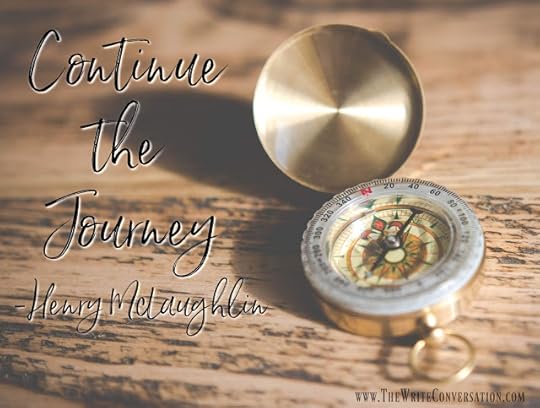
by Henry McLaughlin @RiverBendSagas
Continue the Journey has been my tag line since I first became serious about writing and printed my first business cards. Obviously it stems from my debut novel, Journey to Riverbend. But there’s more to it than just a gimmick to remind people about the book. (Did I mention my first book is Journey to Riverbend? Did I mention there’s a three book series?)
While I worked on the story of Michael and Rachel, the themes of the novel emerged in the characters’ lives. The themes of reconciliation, restoration, and self-forgiveness manifested as Michael and the posse pursued the kidnappers and Rachel battled and defeated her own demons of unworthiness back in town.
And the other theme that came out is life as a journey. More than the natural journey of birth to death. Or the journey from youth to adulthood, to career and family and responsibility.
And I know this idea of life as a journey is not a sudden new revelation. It’s not the discovery of a workable warp drive or a transporter beam. Or even a food replicator.
Life is not just one journey. It is several. And they overlap and they impact each other and set us on a course. Or throw us off course if we let them. We decide which course as we walk out our journey.
Michael grew up in a violent family. And this violence continued in his life until he accepted Jesus. And his journey slowly turned. It wasn’t an immediate deliverance from his past behaviors. While no longer violent or abusive, he was still constrained by the guilt and shame of the man he had been to the point where it was difficult for him to be the man he needed to be.
His Journey to Riverbend contains his first steps toward self-forgiveness and restoration. His journey is not finished at the end of Book One just as ours are not finished when we reach certain stages in our lives. Like Michael, we continue the journey to spiritual understanding and maturity everyday, to a closer relationship with our Lord and Savior, to fulfilling His plan for our lives. To doing us so God’s creation can be complete.
Some days we take a step back or slip off the road. Then we get back up and continue the journey to a more complete person, to the person God has called us to be in this life.
Where are you on your journey?
TWEETABLE
Continue the journey - insight on the #writing path from Henry McLaughlin, @RiverBendSagas on @EdieMelson (Click to Tweet)
 Henry’s debut novel, Journey to Riverbend, won the 2009 Operation First Novel contest.
Henry’s debut novel, Journey to Riverbend, won the 2009 Operation First Novel contest.Henry edits novels, leads critique groups, and teaches at conferences and workshops. He enjoys mentoring and coaching individual writers.
Connect with Henry on his blog, Twitter and Facebook.
Published on March 25, 2020 22:00
March 24, 2020
Tips to Write Through the Chaos

by Edie Melson @EdieMelson
Life happens to all of us, and with it comes times of chaos and catastrophe. It’s easy to get derailed and let our writing life come to a screeching halt. That’s never a good thing, no matter what crisis we’re dealing with—from the death of a loved one, to an unexpected pandemic. Because as writers, we process life by putting words on paper (or screen). Suddenly finding ourselves with no time or energy to write can be as traumatic as the original event.
We need that exercise to keep us sane. The things we write may change, depending on the circumstance where we find ourselves, but I propose that we will cope better by setting aside time. Today I want to share some tips to keep moving forward when life happens.
In case you think I’m dealing with concepts instead of reality you should know that I’m actually writing this blog post from a place of chaos. It’s been a tumultuous couple of weeks around my house. My father suffered a stroke while I was out of town teaching at a conference (he’s continuing to improve), I found myself bedridden with a nasty sinus/ear infection, and our daughter-in-law lost her father. On top of that, my Guideposts military blog, While They Serve, launched right smack dab in the middle of all this.
Trust me, I know what I’m talking about here. This is how I’ve survived many upheavals in my life.
Prioritize, prioritize, prioritize: During times like these, a calendar is your best friend. Sit down and look at all you have on your writing plate.
Start with the things you’re getting paid for and/or you consider legitimate work. Those need to have top priority.Next look at things you’ve made a commitment to do. These could be anything from blogging on your own site to blogging on other sites or other types of writing. The thing you want to do with this group is look and see what you can reschedule, back out of, postpone, or ask someone else to do.Finally look at the things you wanted to accomplish. This might include things like get a piece ready for a contest or submission or just making forward progress on your current WIP (Work In Progress).Now, before you set down the calendar, look at the commitments generated by the chaos. These could include doctor visits, time at the hospital, time without electricity, anything out of the ordinary.
Begin fitting projects into the spaces around your commitments. I know this doesn’t always seem possible, but you can get significant progress in 20 – 30 bites of time. Here are some tips to write in the bits and pieces of time you've got.
For example, one thing I must do is schedule social media every morning. It’s part of my job at My Book Therapy. I would get to the hospital in the morning. Spend some time visiting with my mom and dad, then announce I had 30 minutes of work to do. Assuming a doctor didn’t come in, I kept my head down and worked for that space of time. Afterwards, I closed my laptop and again was available to visit, help, etc. I also took several breaks during the day to answer comments on my new Guideposts blog, as well as my own.
We all know this isn’t the ideal to write, but you have to use the time you can carve out.
Additional TipsContact those places where you have commitments. People will forgive a lot if they know what’s going on. This is the time to be an EXCELLENT communicator.Call in favors, and enlist guest bloggers where you can for your own site.Don’t forget you can recycle old posts to save creative energy for paid writing assignments.Cut back on the number of social media updates you put out daily and/or eliminate them altogether. But don’t be afraid to use social media to ask for prayer support. Your readers and audience will feel more connected to you by sharing this part of your life.Try to carve out time to work on something you want to do. It may be a blog post, a WIP, a devotion or even a poem. But if you feel that creative hunger, feed it. You’ll be calmer and more able to cope if you do.Don’t waste what’s happening, instead incorporate it into your writing. If you have a blog, do what I’m doing and share your process in a post. At the very least, find a place to write out your feelings and journal what’s happening. If you can’t use it immediately, I guarantee it will come back when you need it. Just don’t lose it by not recording it.Try your hand a writing a devotion. If life is in chaos, I guarantee you’re learning some tough lessons. You may not end up with a finished product, but jot down the details of what you’re learning.Write a poem. Yes, you read that right. It doesn’t have to rhyme, but it can. And it doesn’t even have to be good. But searching for the words to describe intense feelings is a good way to process and come to grips with a life that seems out of control. If a full poem seems too intimidating, consider a haiku. Here’s a link to help you Write a Haiku. Use this time to accomplish small tasks. Here are just a few to get you started:Write a character sketch.Research a setting or job descriptionCheck your timeline.Edit a chapter.Make a list of possible blog posts.Pick an emotion and brainstorm ways to show it rather than name it.We all have times that could potentially stop all forward momentum in our writing lives. But it doesn’t have to. And when you’ve weathered the storm, you’ll be glad you kept moving.
I’d love to know what you do to stay on track with writing when chaos happens. Be sure to share your thoughts below.
Don’t forget to join the conversation!Blessings,
Edie
TWEETABLE
Tips to Write through the Chaos - @EdieMelson (Click to Tweet)
 Edie Melson is a woman of faith with ink-stained fingers observing life through the lens of her camera. No matter whether she’s talking to writers, entrepreneurs, or readers, her first advice is always “Find your voice, live your story.” As an author, blogger, and speaker she’s encouraged and challenged audiences across the country and around the world. Her numerous books reflect her passion to help others develop the strength of their God-given gifts and apply them to their lives. Connect with her on her website, through Facebook, Twitter and Instagram.
Edie Melson is a woman of faith with ink-stained fingers observing life through the lens of her camera. No matter whether she’s talking to writers, entrepreneurs, or readers, her first advice is always “Find your voice, live your story.” As an author, blogger, and speaker she’s encouraged and challenged audiences across the country and around the world. Her numerous books reflect her passion to help others develop the strength of their God-given gifts and apply them to their lives. Connect with her on her website, through Facebook, Twitter and Instagram.
Published on March 24, 2020 22:00
March 23, 2020
Dipping the Quill Deeper: The Overnight Publishing Success Story
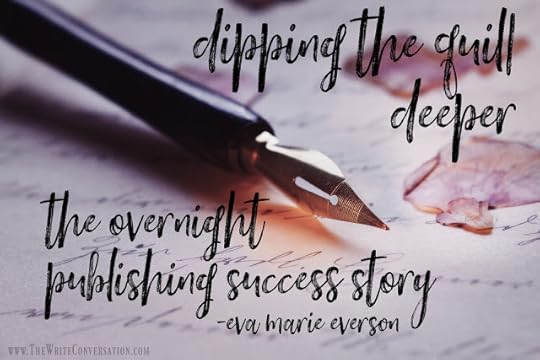
by Eva Marie Everson @EvaMarieEverson
In 2000, Multnomah Books published a book by Bruce Wilkinson titled The Prayer of Jabez. This less-than-100-page book was deemed the first in a ten-book series known as The BreakThrough Series. I’m not sure the publishing staff at Multnomah could have, in the beginning, envisioned the monstrous success this book would become. To date, it has sold more than 10 million copies and sparked countless numbers of products. I suspect I know why.In this book, which focuses on a short prayer by a barely known biblical character named Jabez (1 Chronicles 4), offered what we all hope for: prosperity in our work, God’s hand over us, and His protection from the evil one.
Jabez cried out to the God of Israel, saying, "Oh that you would bless me indeed and enlarge my territory! Let your hand be with me,
and keep me from the evil one."
And God granted his request.
The timing had been right for such a little book concerning such a little prayer. People needed to hear this message. Christians—and those who danced on the hemline of faith—began to quote the prayer daily, almost as if the words themselves held some form of magic. Most Christians I know found themselves growing stronger in their faith as the days and weeks went on. Some did not (perhaps they were praying for all the wrong reasons). And many, such as myself, came to realize that “enlarge my territory” came with a great deal of responsibility on the part of the one praying. To have the territory in the first place means to work the territory. To “let your hand be with me” means to grab hold of that hand in our work and in our families, and being kept “from the evil one” means that you wake up in the morning and the devil has reason to fear.
This Means Work, Not Just Words
It’s easy to pray a simple prayer. To recite it to the nth degree. To hope the results are like those from the twitching of Samantha Stephen’s nose or Jeannie’s arms-crossed-blink. And God granted his request does not necessarily read “and God said, ‘Poof’ and it was done.”
It is clear that Jabez, like King David, was a man after God’s heart. He didn’t just pray—he cried out. He also saw that the enlarging of his territory meant the blessings of others; I say this because I don’t believe God would have blessed Jabez so that the man could hoard the blessings. Jabez was, in my mind, a man who worked diligently at his job but knew that the blessings and profits did not come only from that hard work but from trusting God with the everyday tasks.
He also knew the devil had his eye on him and his prayer tells me that he didn’t rely on his own strength. Or his own abilities.
The Overnight Success
I have yet to meet a Christian writer who was an overnight success. Oh, it may seem they were because you’d never heard of them. Few had heard of them until one day—poof. But poof did not really happen. I promise you that behind that “easy success” was years of work and preparation. Work and prayer. Work and follow through. Work and more prayer.
Take the author of The Prayer of Jabez for example. Before writing his “overnight success,” Dr. Wilkinson had been (and continues to be) a consummate teacher. He earned multiple degrees (one does not typically do this by slouching)—a B.A., a Th.B, a Th.M., and a D.D.—and served as a college professor. He had, years before penning Jabez, developed Walk Thru the Bible . He worked as a publisher and an editor and he served God by ministering in Russia after the fall of the Soviet Union.
Grass had hardly grown under his feet.
If This Is What You Want …
… then plan to work hard. Writing isn’t easy; if it was, everyone would do it, do it well, publish their work, and go on to be one of those “overnight success” stories. Writing to publication takes hours of poring over words. Research. Diligence. Late-night sessions in front of a computer when what you really want is to be asleep in bed. Revisions. Scrapping the whole project and starting over. Learning to take criticism and then putting that criticism to good use. It means not getting to do something you really wanted to do because you are under contract and the date is nearing. It means back cramps. Burning eyes. Headaches. Stiff and aching fingers. Meals that consist of a sandwich a few chips because you don’t have time to eat.
To be a Christian author in particular—and in whatever level of success God ordains for you—means trusting Him with your work. Praying for an enlarged territory so that you can bless others (and knowing that an enlarged territory means more work, not less). And knowing that you know … there is an evil one with his eye on you. So, you’d best type with one hand and hold your sword with the other.
More on that next month …
TWEETABLEDipping the Quill Deeper: The Overnight Publishing Success Story - @EvaMarieEverson on @EdieMelson (Click to Tweet)
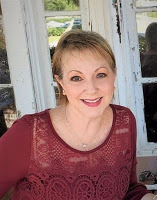 Eva Marie Everson is the president of Word Weavers International and the director of its two conferences. She is the multiple award-winning author of nearly 40 works and has received awards as a speaker and Bible teacher. Eva Marie is often seen at writers conferences across the States. She served as a mentor for Jerry B. Jenkins’ Christian Writers Guild for several years, and taught as a guest professor at Taylor University in 2011. She and her husband make their home in Central Florida where they enjoy their grandchildren. They are owned by one small dog and a princess cat.
Eva Marie Everson is the president of Word Weavers International and the director of its two conferences. She is the multiple award-winning author of nearly 40 works and has received awards as a speaker and Bible teacher. Eva Marie is often seen at writers conferences across the States. She served as a mentor for Jerry B. Jenkins’ Christian Writers Guild for several years, and taught as a guest professor at Taylor University in 2011. She and her husband make their home in Central Florida where they enjoy their grandchildren. They are owned by one small dog and a princess cat.
Published on March 23, 2020 22:00
March 22, 2020
Backstory for Writers: When and How
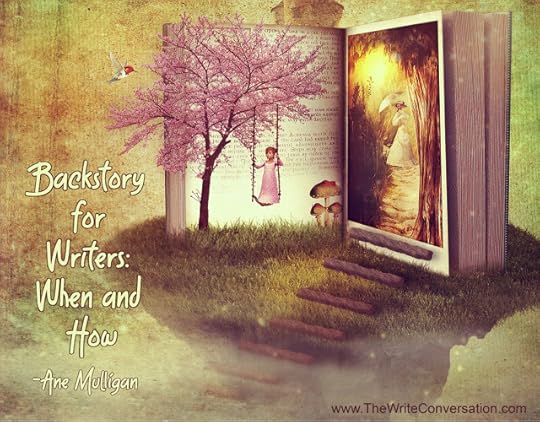
by Ane Mulligan @AneMulligan
I love backstory but not in the beginning pages of a book. There. I said it. When I mentor new writers, they invariably ask, "But how will the reader know my character? Where she's been and what made her the way she is now?"That's easy, little scribe. We show it by their reactions and their worldview.
Let me back up explain how I learn about my characters, before I write word one. I have a character interview I've developed over the last 20 years. I've borrowed from other authors and cut out things from mine. Now it's down from seven pages to a single one with the most important questions.
After I've filled in the basics, I begin a stream-of-consciousness backstory. This is where I find out my character's secrets, deep wounds, the lie they believe and why. I start with where and when they were born and who their parents were. The things I've learned about my character through that alone has sometimes been dramatic. The backstory helps develop my character's worldview, especially once the lie has been revealed.
In my August 2020 release, In High Cotton, Maggie Parker and her sister, Duchess, have rich backstories. They were raised together but vastly differently. I had to go back three generations to discover why. But the discovery was worth the trouble. These two are my favorite characters I've ever written.
But I didn't tell any of their backstory until I hit chapter four, and then only small tidbits. Being careful I didn't do an info dump of a fact the characters would have all known, I insert a single bit into dialogue or interior monologue. And only a single sentence. From In High Cotton, I introduce the reader to Maggie's mother-in-law this way:
At fifty-two, she is still a lovely woman. Though her legs are puny from the polio, her arms are firm, and her face remains unwrinkled.
Because this is on page 27, it's too early for any real backstory, but the one sentence lets the reader know this woman had polio at some point in her life. (Side note: in 1929, people said "the" polio.)
The thing about backstory is it pulls the reader from the forward action of the story. The example above fits where it is because of what Maggie will do for her mother-in-law in the chapter. In this case, the reader needs to know she's in a wheeled chair. Maggie's narration is natural, the kind of thought a person might have noticing how she looks. (Side note: that's what they called a wheelchair then)
It takes time in life to get to know a person. The same happens in a novel. I don't want to hear your life story until I care about you. I'll bet you're the same. Oh, come on, you know it's true. And readers feel the same. Open your story showing us how your character reacts to some crisis or to her surroundings. Show me her worldview, but don't lace in any backstory up front.
Have you ever been to a party where several of the attendees are new to you? Have you ever been cornered by your host's second-cousin-thrice-removed and she begins to tell you all about her divorce, her latest illness which led up to her gallbladder operation? You're nodding absently while looking for the nearest exit.
A novel is like a party in that way. So let's be good to them. You need the backstory to know your characters. But as a writer, it's your job to show the reader why they are the way they are, not tell them. Telling takes out the fun of discovery.
Do you have any examples to share how backstory was done well of poorly? Join the conversation!
TWEETABLEBackstory for Writers: When and How from @AneMulligan on @EdieMelson (Click to Tweet)
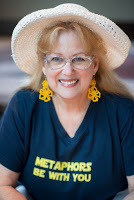 Ane Mulligan has been a voracious reader ever since her mom instilled within her a love of reading at age three, escaping into worlds otherwise unknown. But when Ane saw Mary Martin in PETER PAN, she was struck with a fever from which she never recovered—stage fever. She submerged herself in drama through high school and college. Years later, her two loves collided, and a bestselling, award-winning novelist emerged. She resides in Sugar Hill, GA, with her artist husband and a rascally Rottweiler. Find Ane on her website, Amazon Author page, Facebook, Twitter, Instagram, Pinterest and The Write Conversation.
Ane Mulligan has been a voracious reader ever since her mom instilled within her a love of reading at age three, escaping into worlds otherwise unknown. But when Ane saw Mary Martin in PETER PAN, she was struck with a fever from which she never recovered—stage fever. She submerged herself in drama through high school and college. Years later, her two loves collided, and a bestselling, award-winning novelist emerged. She resides in Sugar Hill, GA, with her artist husband and a rascally Rottweiler. Find Ane on her website, Amazon Author page, Facebook, Twitter, Instagram, Pinterest and The Write Conversation.
Published on March 22, 2020 22:00
March 21, 2020
Walking Through the Storms of Life
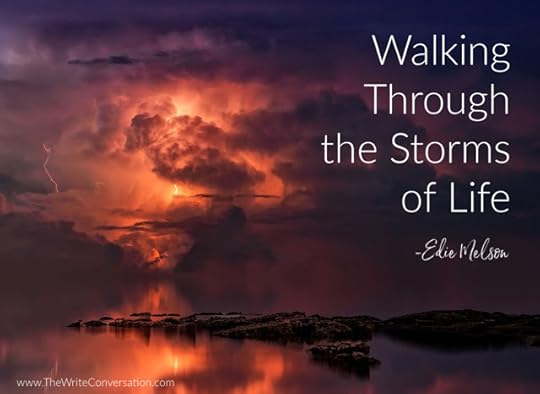
by Edie Melson @EdieMelson
Nothing can ruffle our feathers like a storm. And some seasons of life bring a series of storms. With all that’s going on around us with Covid19, we’re in the middle of a big one.
However storms don’t have to be hurricane size to be exhausting. Sometimes it’s the tiny, ongoing circumstances that sap us the most. Like single drops of water in series have the ability to wear away solid rock, so these recurring events deplete our energy and—in the process—draw our focus away from God. Doing life apart from God is the true source of ruffled exhaustion. And the tiny disturbances offer the strongest temptation to handle life ourselves. Most of us have learned to take the big stuff to God. But we still hesitate to bother Him with the small.
One of the most intense struggles in my life came while my dad was in the final stages of Alzheimer’s. My mother was his primary caregiver, but my sister and I were actively helping support her. I was under contract and finishing a book.
I’d done what I thought was a pretty good job of turning over my stress to God. I was prayed up in regard to Daddy’s illness, my mother’s exhaustion, and my book. The rest of life I was handling on my own. Only I wasn’t. It seemed the smallest issue would set my feathers flying in all different directions as I pecked at the people who were trying to help.
After one particularly trying morning at the assisted living facility, my family urged me to take a break and go get lunch—alone. At the time I thought they were giving me space. Looking back I realize they were probably trying to get a break from me.
I hopped into my car and almost immediately the irritations seemed to mount. I was almost out of gas, there was a line at the gas station, the pump was out of receipt paper. Traffic was bad, drivers were rude, and the drive-through line at my favorite fast food restaurant wrapped around the building. I didn’t care. I wanted chicken and chicken I was determined to have—even if I had to wait an hour.
Parking and going inside would have solved the long line problem, but I was a mess and I knew it. I didn’t want to show up in a public place with rumpled clothes and rumpled feathers. I wanted something in life to be easy, but it didn’t seem that was going to happen.
The drive through line eventually divided into two lanes and of course I chose the lane that never seemed to move. For some reason, that was the straw that broke the camel’s back. Sitting in my car, I lost it. I cried. I ranted. I’m ashamed to say I think I even raised my fist at God. I accused Him of picking on me, of forgetting me—the impossibility of someone picking on me while simultaneously ignoring me wasn’t something I considered in that middle of feather-flying fit.
As my sobs turned to hiccups, I felt the voice of God whispering into my soul. He reminded me that I’d been trying to handle all the details of my crazy life on my own—apart from Him. He gently stroked my feathers and reminded me He cared about all of my life, not just the big stuff. I felt peace beginning to return, but I asked Him for some confirmation. I wanted something odd, but so obviously from Him, I would know for sure that He did care about all the unimportant—exhausting—parts of my crazy life.
I pulled to the window to pay and pick up my order and the clerk gave me a tentative smile. I cringed because I realized a lot of people must have noticed my tantrum. “The lady in front of you paid for your order. But she was adamant I give you this message. She wanted you to know that whatever you’re going through right now, God knows, and He cares.”
Somehow I managed to thank her through my tears and drove off. I parked at the edge of the lot because I was crying so hard I couldn’t see to drive. But it was worth the kerfuffle. God had reminded me—in a way I’ll never forget—that He cares about everything—tiny and big—that is happening in my life.
I learned three important things that day.
Peace never comes to us apart from God
If I am not in close communion with God, then nothing goes smoothly. When I flutter away, feathers ruffled by emotions and circumstances, I know that I have drifted from the one who makes life smooth. I’ve wandered away from my anchor, my foundation, my Jesus.
"Peace I leave with you; My peace I give to you; not as the world gives, do I give to you. Let not your heart be troubled, nor let it be fearful” (John 14:27).
Peace is an on-going process
Finding rest in God’s peace it is not a permanent condition. Just as my circumstances constantly change, so does my quest for peace and the steps I take to renew it. But my ability to live in it depends on me, never on God’s whim.
“Now may the God of peace Himself sanctify you entirely; and may your spirit and soul and body be preserved complete, without blame at the coming of our Lord Jesus Christ. Faithful is He who calls you, and He also will bring it to pass” (1 Thessalonians 5:23-24).
Peace is attainable
God is faithful and able to do what He promises. He promises us peace in every circumstance and I am living proof that He is able.
How do we really know it’s attainable? This is the verse I go to when I need to remember that God and God alone is my sustainer.
“I love Thee, O Lord, my strength. The Lord is my rock and my fortress and my deliverer, my God, my rock, in whom I take refuge; my shield and the horn of my salvation, my stronghold. I call upon the Lord, who is worthy to be praised, and I am saved from my enemies” (Psalm 18:1-3).
So where ever you are today, God is there with you. His peace is available to each of us, all we need to do is look up and see Him enveloping us in His love.
*reprinted with permission from UnRuffled: Thriving in the Midst of Chaos, Bold Vision Books, 2019
TWEETABLE
Walking Through the Storms of Life - @EdieMelson (Click to Tweet)
 Edie Melson is a woman of faith with ink-stained fingers observing life through the lens of her camera. No matter whether she’s talking to writers, entrepreneurs, or readers, her first advice is always “Find your voice, live your story.” As an author, blogger, and speaker she’s encouraged and challenged audiences across the country and around the world. Her numerous books reflect her passion to help others develop the strength of their God-given gifts and apply them to their lives. Connect with her on her website, through Facebook, Twitter and Instagram.
Edie Melson is a woman of faith with ink-stained fingers observing life through the lens of her camera. No matter whether she’s talking to writers, entrepreneurs, or readers, her first advice is always “Find your voice, live your story.” As an author, blogger, and speaker she’s encouraged and challenged audiences across the country and around the world. Her numerous books reflect her passion to help others develop the strength of their God-given gifts and apply them to their lives. Connect with her on her website, through Facebook, Twitter and Instagram.
Published on March 21, 2020 22:00
March 20, 2020
A Writer Looks at Grief
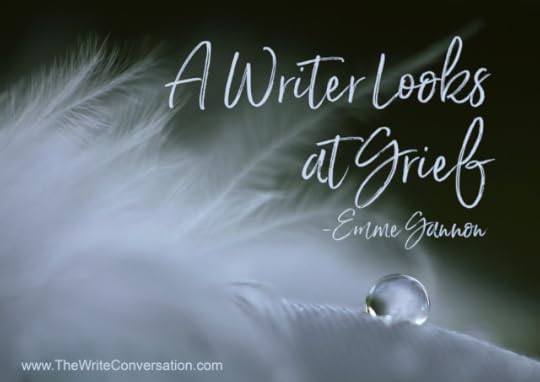
by Emme Gannon @GannonEmme
The dictionary describes grief as, “keen mental suffering or distress over affliction or loss; sharp sorrow, painful regret. Agony, despair.”
These emotions can be fueled by rejection by an agent, the loss of a pet, the death of a loved one, or any incident that collapses our world. Grief takes hold of us like a vice, smothering our creativity by snuffing out our dreams for today and tomorrow. We crash emotionally. Our bodies feel like lead. The hole in our heart produces crushing emotional pain. Our mind won’t let go of the picture of what could have been. Our self-talk changes from hope to one of despair. While these reactions often occur after loss, there is one aspect of grieving that spirals us into the dark recesses of the abyss. That is to blame God. To feel forsaken by the God who we felt we could depend on.The Biblical story of Ruth reveals how the death of both Naomi’s husband and two sons so shattered her life that she needed someone to blame. Who better than God, who controls the universe. She even changed her name from Naomi to Mara, “because the Almighty has made my life very bitter.”
We read that Naomi’s story ended well. She traveled back to Israel with her daughter-in-law Ruth, who married her relative Boaz and gave birth to Obed, who was the grandfather of the great king David, who God described as, “A man after my own heart.” Naomi became the great-grandmother of David. She was renewed and strengthened in her old age. All because God is faithful in loss and His timing is perfect, a fact that her grieving had hidden from her.
Naomi’s happy ending, however, isn’t what she envisioned in the beginning. She blamed God for taking away her men. Grief at her loss clouded her vision of the possibility of a bright tomorrow.
Loss often causes us to look back and do a cross-check of our lives. We tally our successes from our failures. In our mourning we decide to abandon that which we determine did not achieve success, in spite of all our efforts. We then decide to play it safe and live in the realm where we feel in complete control—using talents with good tract records—never reaching beyond the sphere of possibilities. We stick our fingers in our ears so that we cannot hear God whisper His next assignment. One that will require a huge step of faith and maybe, just maybe, the risk of rejection by our peers.
As we continue into Lent, that penitential time before Easter where we take an especially hard look at our walk with our Savior, let us challenge ourselves to allow the Lord to shine His light into the dark recesses of our soul. The hurts. The losses. Let Him speak His perspective into our sorrows and bring light into the dark places that have had the power to cloud our vision of who we are and what His plan is for today and tomorrow.
Loss is not defeat. Instead, when God removes something from His children, He fills that empty place with more of Himself. For now, we wait and watch and listen for His whisper that says, “This is the way. Go in it.”
TWEETABLEA Writer Looks at Grief - @GannonEmme on @EdieMelson (Click to Tweet)
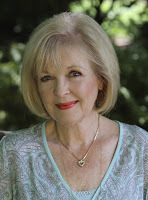 Emme Gannon is a wife, mother, and grandmother who loves to write stories that stir the heart. Her award-winning writing has appeared in Focus on the Family magazine, several anthologies, and numerous newsletters. She just completed her first novel.
Emme Gannon is a wife, mother, and grandmother who loves to write stories that stir the heart. Her award-winning writing has appeared in Focus on the Family magazine, several anthologies, and numerous newsletters. She just completed her first novel.
Published on March 20, 2020 22:00
Ways Writers Can Share Words of Hope Right Now
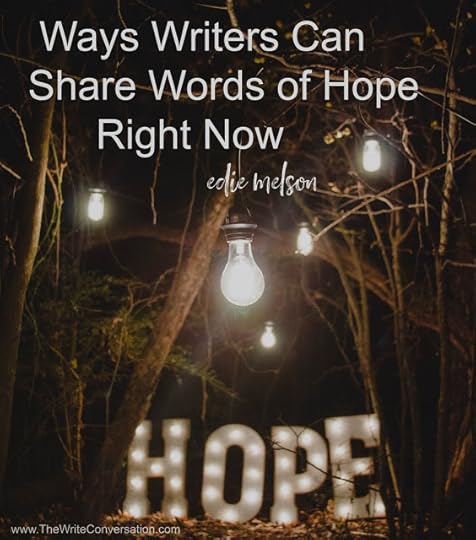
by Edie Melson @EdieMelson
Powerless uncertainty.
If you dig below the hysteria, that seems to be one of the most prevalent underlying fear. But I think the way to deal with it is to dig it out and look at it for the lie it is.
As believers, even though the events around us are uncertain, we have the ability to hold tight to the God of certainty.
Even more than that—as writers—we have the unique ability RIGHT NOW to share that certainty with the world.
Power for ChangePower for HopePower for CertaintySo how do we spread our words where they'll do the most good—and help us feel less powerless in the process?
Ways to Share Words of Hope
ONLINEWrite a blog post. Just like I'm doing now, if you have a website and/or blog, use it to share the certainty we have in Jesus. Write something positive on Facebook. Facebook is a good place to share a devotion or encouraging thought. And there's no better time than right now to do it. Make a meme. (Rhymes with seem.) A meme is a picture with words embedded on it. You can use AdobeSpark, Picmonkey, Canva, or even an app on your phone like WordSwag to create one. Tweet a meme or link to something positive on Twitter. Be sure to hashtag it (#) I recommend two or three of the most relevant hashtags to the tweet you send. Possibly #Faith #GodsLove #Covid19 #Positive #Encouragement etc. Begin a new board on Pinterest with something that will help those stuck at home. Maybe a crafts with kids board, or recipes, or positive quotes. Share a meme or beautiful picture on Instagram. You could write an accompanying devotion as a caption. I do that a lot on Instagram. You can follow my account ( @Stop2Pray ) to see examples. Share something funny. It could be a video or a cartoon, or just something funny that happened to you. We can all use a good laugh right now. Ask questions. You could ask for suggestions for TV shows or movies to watch. You could also come up with a list of questions for others to answer. They could include questions like, "What's your favorite pie?" "Have you ever ridden a motorcycle?" etc. There are many floating around on social media, but don't limit yourself to those, make up one of your own. Begin an online gathering. I know several writers who have taken to FB Live and are sharing their skills in free mini-workshops. DiAnn Mills is sharing a class on self editing in our Blue Ridge Conference Writers group on this coming Monday at 1pm CDT. Others are starting online Bible studies. With today's technology, we can still gather together for encouragement. Don't forget the power of the STORY feature in Instagram and Facebook. When you post something in your story—as opposed to just a regular post—everyone will see it. I'm adding encouraging memes to my story in IG and FB every day. OFFLINEDo you remember the good ole days? We actually got letters and cards in the mail! I think it's time to resurrect that practice. There are a lot of people out there who are lonely. Brighten their day with a letter. You could also call a local assisted living center and ask for addresses and send letters and cards there.
Truthfully, the more I worked on this post, the more ideas I had. But every post has to end somewhere! LOL! So now it's your time to chime in. What are some ideas you have to share words of hope during this season of challenge? Be sure to leave your thoughts in the comments section below.
Don't forget to join the conversation!Blessing, Edie
TWEETABLEWays Writers Can Share Words of Hope Right Now - @EdieMelson (Click to Tweet)
 Edie Melson is a woman of faith with ink-stained fingers observing life through the lens of her camera. No matter whether she’s talking to writers, entrepreneurs, or readers, her first advice is always “Find your voice, live your story.” As an author, blogger, and speaker she’s encouraged and challenged audiences across the country and around the world. Her numerous books reflect her passion to help others develop the strength of their God-given gifts and apply them to their lives. Connect with her on her website, through Facebook, Twitter and Instagram.
Edie Melson is a woman of faith with ink-stained fingers observing life through the lens of her camera. No matter whether she’s talking to writers, entrepreneurs, or readers, her first advice is always “Find your voice, live your story.” As an author, blogger, and speaker she’s encouraged and challenged audiences across the country and around the world. Her numerous books reflect her passion to help others develop the strength of their God-given gifts and apply them to their lives. Connect with her on her website, through Facebook, Twitter and Instagram.
Published on March 20, 2020 04:36



